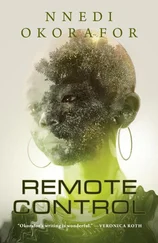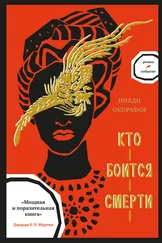Ннеди Окорафор - Lagos Noir
Здесь есть возможность читать онлайн «Ннеди Окорафор - Lagos Noir» весь текст электронной книги совершенно бесплатно (целиком полную версию без сокращений). В некоторых случаях можно слушать аудио, скачать через торрент в формате fb2 и присутствует краткое содержание. Город: New York, Год выпуска: 2018, ISBN: 2018, Издательство: Akashic Books, Жанр: Детектив, на английском языке. Описание произведения, (предисловие) а так же отзывы посетителей доступны на портале библиотеки ЛибКат.
- Название:Lagos Noir
- Автор:
- Издательство:Akashic Books
- Жанр:
- Год:2018
- Город:New York
- ISBN:978-1-61775-523-1
- Рейтинг книги:4 / 5. Голосов: 1
-
Избранное:Добавить в избранное
- Отзывы:
-
Ваша оценка:
- 80
- 1
- 2
- 3
- 4
- 5
Lagos Noir: краткое содержание, описание и аннотация
Предлагаем к чтению аннотацию, описание, краткое содержание или предисловие (зависит от того, что написал сам автор книги «Lagos Noir»). Если вы не нашли необходимую информацию о книге — напишите в комментариях, мы постараемся отыскать её.
Lagos Noir — читать онлайн бесплатно полную книгу (весь текст) целиком
Ниже представлен текст книги, разбитый по страницам. Система сохранения места последней прочитанной страницы, позволяет с удобством читать онлайн бесплатно книгу «Lagos Noir», без необходимости каждый раз заново искать на чём Вы остановились. Поставьте закладку, и сможете в любой момент перейти на страницу, на которой закончили чтение.
Интервал:
Закладка:
But not only was it possible, it happened. Yinka was fired that December. And Yinka wilted in unemployment, he shriveled, might as well have swallowed himself — in other words, o ru. You had decided to put your savings into retail and had made the final payment for a store on Bode Thomas, where you would sell children’s clothes imported from the US, and the months that followed were the most difficult yet. In those months, you felt the entire weight of your marriage shift toward your side. Sometimes, as you lay together at night, you would ask Yinka how things were going, whether things were going to be better, wanting him to say yes. But Yinka would never respond. All you knew was that he was looking for a job, and that he was getting tired of it. You would face your side of the bedroom, your back against his, and sigh.
And then one night, you asked again how he was feeling and as you turned away ignored, you heard him say: “You had no right to withdraw that girl from school.”
Ọlọrun, you swore to yourself, that girl will not kill me.
The film was Kabhi Khushi Kabhie Gham and you were the only one in Lagos who hadn’t seen it. You had asked your salesgirl, Kemi, to buy a copy as she left for Ola Iya, the nearest canteen to your store, where she bought lunch for your favorite customers. The boys who hawked films always swarmed that area. It was Bola from your still-defunct book club — who since you opened the store had become one such customer — that recommended the film. She owned a beauty salon in Akerele that was famous for its stock of Indian films and was surprised when you told her you had never heard of it.
On Christmas Eve, you walked into your living room while the film was playing. You still hadn’t watched it, but you recognized the soundtrack, which the girls at Bola’s salon overplayed. That evening, you arrived home from your shop to a house that smelled of your signature perfume, and a front door that had been left unlocked, as if for you. You could hear laughter, a commingling of voices. You feared the worst was happening and stormed into the living room to meet Yinka, laid out on the sofa, laughing, and Joy, seated on the ground across the sofa, laughing too. She saw you and greeted, “Welcome, ma.” She no longer hid her face when she spoke to you and you were still very unfamiliar with this renewed Joy. She even looked at you as if she was searching for traces of panic and enjoying it.
“Go and bring the things from the car,” you said to her, your voice scattered, eyes darting. “Where is Sesan?”
She responded: “Baby is sleeping, ma.” And when she walked past you heading for the door, you swore she meant to lean toward you, because you smelled it all over her. Yes, your perfume, but that wasn’t even it, the ọdaju-eyan wasn’t wearing any underwear. She stank of lust.
You never discussed Christmas Eve with Yinka. You simply weren’t sure, still had your doubts. Premature confrontation was for women in Yoruba films and you were more pragmatic than that. The only time you had tried to tell Yinka that there was something odd about Joy, he looked at you strangely, having never forgiven you for removing the girl from school, having threatened you about sending her back to Mama Lateef, yelling, “Haven’t you done enough?” Besides, you don’t just wake up and accuse your husband of sleeping with the house girl because what if he says that he did? What then? O-hoo. And you knew Yoruba men owned up to much worse.
You tried taking the matter to God. You followed Bola, whose issues with her husband seemed to have been miraculously resolved, to three prophets, one of whom was an ẹlẹmi that assured you the Devil was in your house.
“The Devil,” the elemi said in tongues the other prophets translated, “wants all that is yours. The Devil covets and when you have lost everything, the Devil, being insatiable, will come for you.” Bisi, ṣọ ara ẹ. La oju ẹ! The prophets wanted to know if you had been having strange dreams and you told them of the woman you sometimes dreamed of, who by this time had some stories of her own. You told them how now the woman in your dreams wanted you to listen to her own stories, how you had never seen the woman’s face, never mind the many times you had tried to steal a glance. You never mentioned Christmas Eve, never mentioned how, on several occasions since then, you had caught Joy glaring at you, and how, each time, you had felt like something about to be eaten. You only listened as they told you what special prayers they would make on your behalf and wrote down their instructions for your part in this battle against Satan: Light one abẹla each day of the week for seven weeks; mark what is yours with anointed oil; cover all mirrors; read Psalms 27 and 109 first thing every morning and last thing every night; gbadura! Gbadura!
And you would have put your heart into each and every one of these things had they seemed dependable, had you not closed your heart to God long before you even met Yinka, and if prayer didn’t turn to dust in your mouth whenever you tried to call on Him. You remembered that in the Nollywood films both you and Joy used to watch, justice arrived on the heels of crimes — if not immediately, eventually. The question, then, was should you simply wait for your justice to arrive? Throughout your life, you had watched women like Patience Ozokwor play villains, and seen that villains were always vanquished, but you also knew that the Hilda Dokubos of Nigerian cinema played scorned, tortured women who always outlived their malefactors but were never duly compensated. Always. Where on that spectrum would Joy place herself? Where would she place you? Did she consider these things as she tormented you?
You believed justice according to Nigerian films was clumsy, neither fair nor meaningful, always lax on villains: all one really needed to do was confess her crimes and next were the credits and To God Be the Glory. But that did not mean such films were false; in fact, you were banking on the inevitability of getting away with whatever it was you were going to do to Joy. If you looked hard enough, wouldn’t you see that everyone who was anyone in Lagos was a villain in some way? You were going to trade places with Joy, take control of the script, give Hilda the juju for once, and let Patience mourn. You wanted it that way so that when people tell this story, because they always will, listeners will find it difficult to imagine you. In their minds, you’d transcend that spectrum, being neither a typical Patience nor a Hilda and nowhere in between. There are three kinds of women, and the third, you swore, was your kind — an Ijebu woman defending her house, the kind of woman to go after what was hers, the kind to hold no regrets over whatever she does to remain a woman, the kind who never lost.
Once you defined being such a woman as contingent on Joy suffering, there was no stopping you. It was like hearing the voice of God, and nothing had ever sounded as fulfilling, reassuring, or sweet. The moment that voice came to you, you abandoned the prophets for more practical instruments. Then you waited: for the right price, the right amount, for night to arrive, for Yinka to fall asleep, and then for Joy to fall asleep. Once you were certain your conditions had been met, you walked to her bedroom, where Joy slept under air-conditioning and on a foam mattress wrapped in cotton sheets — excesses the result of unnecessary kindness. You had five liters of sulphuric acid in a keg you were going to douse over her like a gardener tending her hedges, until every drop had been assigned a patch of skin. So you opened the door and crept into her bedroom. The room was unlit but you could make out her bed by the window; just outside in the sky hung a sickle moon. You called out to her softly, “Joy, Joy,” and when there was no response you were sure she was fast asleep. It gladdened you. Carelessly, hands shaking, you unscrewed the keg. You held it over her bed and screamed when the door opened behind you with a bang. It was Joy in the doorway and the bed was vacant, just a bunch of pillows that had more than deceived you. She terrified you when she opened the door, and you dropped the keg. You could hear its contents spilling over the ground, singeing the carpet.
Читать дальшеИнтервал:
Закладка:
Похожие книги на «Lagos Noir»
Представляем Вашему вниманию похожие книги на «Lagos Noir» списком для выбора. Мы отобрали схожую по названию и смыслу литературу в надежде предоставить читателям больше вариантов отыскать новые, интересные, ещё непрочитанные произведения.
Обсуждение, отзывы о книге «Lagos Noir» и просто собственные мнения читателей. Оставьте ваши комментарии, напишите, что Вы думаете о произведении, его смысле или главных героях. Укажите что конкретно понравилось, а что нет, и почему Вы так считаете.




![Ннеди Окорафор - Бинти [litres]](/books/399229/nnedi-okorafor-binti-litres-thumb.webp)
![Ннеди Окорафор - Кто боится смерти [litres]](/books/401080/nnedi-okorafor-kto-boitsya-smerti-litres-thumb.webp)






